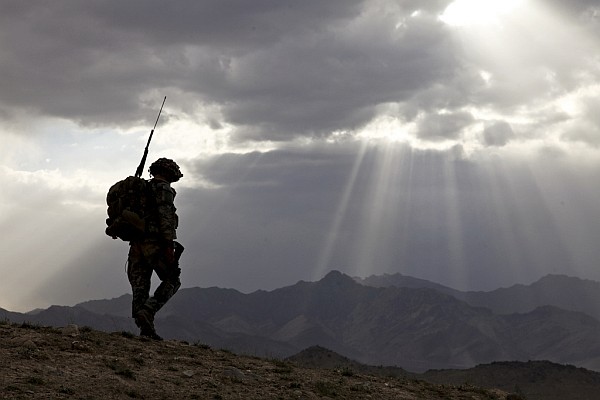
John Bolton writes: “America’s Afghanistan policy is in chaos. Fear of another Vietnam is palpable, and our friends and adversaries worldwide sense it.”
Another Vietnam? If only the US might be so lucky! Vietnam was an exercise in nation building, interrupted by an American occupation, and then fairly swiftly brought to a peaceful conclusion after the US pulled out. The prospects for Afghanistan look much bleaker.
The fear of another Vietnam is more Bolton’s own — “I confess I had no desire to die in a Southeast Asian rice paddy,” he wrote in 1995 when explaining why he supported that war but declined to enter combat duty.
But at 61, Bolton still seems eager to prove his manhood and what better way than in another full-throated appeal for “a sustained military presence in Afghanistan devoted to the grim, relentless crushing of the Taliban and Al Qaeda.”
Americans “need to understand and agree to a ‘long war’.”
In the short war of World War II, Germany and Japan merely needed to be defeated (though more than 60 million people died in the process) — but the Taliban and al Qaeda must be crushed. Not because they pose a greater threat to the world than fascism but rather because they pose a greater affront to power.
This need to destroy an enemy thus aggrandized is inherently flawed in its design because it mirrors American vanity. Those who supposedly need to be crushed cannot be seen for what they are because their significance is seen utterly in terms of what their existence says about us.


Maybe the US government could help out Greece by buying out the Oracle at Delphi. However, I doubt Washington would listen if they were told, “Going to war because of an illusion will destroy a great empire.”
The mind set in America today, that the Military can do anything, change anything, because the American way of life is the preferred way. The people like John Bolton, who had no desire to die in a rice paddy in South East Asia, therefore didn’t serve his country as others of the era did, are very quick to have others sacrifice their lives under the guise of protecting the Country from the bogyman, leaves the majority with of the American people to embrace the same attitude. Unlike Vietnam, there was a draft, where most young people were conscripted, thereby the population had a stake in the War. Today, there isn’t one, also the people who are fighting & dying, are volunteers, so only their immediate loved ones have a stake in the War. Today’s leaders, pundits, right wing zealots, have no conscious or moral quips with sending others to fight & die, nor do the Military Leaders, very few having a personal stake, aside for the glory. All the Treasury wasted today, will be born by the Children, Grand Children, even perhaps their children. What a waste, but those without a personal stake involved, don’t care.
America’s fawning to its military/industrial complex is its BIGGEST issue and has been since Eisenhower first coined the phrase in his farewell speech.
Until this is confronted it will stumble from conflict to conflict in a never ending war against whoever is not on board with American policy.
Lincoln was right no foreign power will ever destroy the US – it destroy itself from the inside out.
Christopher, you may be confusing the sales pitch with the product.
Or to put it another way, propaganda (illusion) is an instrument of war, not the cause of it. In the case of Afghanistan, we don’t know why the US is at war there. I expect it has something to do with the breakdown of pipeline negotiations that took place between the Bush administration and the Taliban in 2000. Unfortunately the documentary record is not yet available, and may never be.
In the case of Vietnam, Daniel Ellsberg leaked the Pentagon Papers, and so we at least know the initial impetus: assist the French in the re-conquest of Indochina. Once it became obvious that this was not realistic, the goal may simply have been to make the Vietnamese pay as high a price as possible for escaping the grip of colonialism, or it may have been simply a matter of maintaining the credibility of American violence in general.
Once the killing starts, other considerations often subsume the original intent.
I guess the point I want to make is that the decision makers don’t necessarily believe their own bullshit.